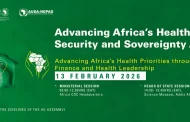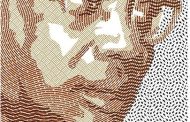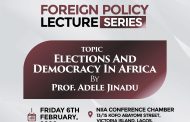The outcome might not be in the proportion of a tectonic shift in challenging epistemological violence against the global subalterns but it would be surprising if it doesn’t trigger the process of the return of such stuff as the corner stone of knowledge production, at least in Nigeria. Not if the attendance reflects the multidisciplinary and thematic spaces listed for coverage.
Under reference is the call for papers and panels for the 60th Anniversary of the University of Ibadan’s Institute of African Studies, (IAS-Ibadan) coming with a currency of language of analysis and a freshness that has not been typical but, above, with a clarity of agenda in terms of finishing off the decolonial business for which the institute and its sisters across Africa could be argued to have been set up in the first case, several decades ago.
It is not clear why none of the super-rich presidential aspirants in Nigeria is underwriting such a major effort at knowledge generation that potential participants have to be charged fees but the call for papers is reproduced below here so as to let the “subaltern’ speak for itself:
Institute of African Studies, University of Ibadan, 60th Anniversary Conference, July 16-20, 2022
“Decolonial Remains: Scrutinizing African Studies in Africa and the Unfinished Business of Decolonization”
Deadline for Application: March 31, 2022
Call for Panels/Individual Papers
Africa-based institutes of African studies occupy pride of place in the history of decolonization on the continent and its diaspora. Prominent among them is our Institute of African Studies at the University of Ibadan (IAS-Ibadan). Decisively established to challenge epistemological and curricular assumptions that were coloured by colonial education, IAS- Ibadan has come a long way in facilitating new prospects of knowing that resonate with African dynamics. Its model has also inspired the operations of other such institutes subsequently established across the continent to mainstream African knowledge systems into the rich confluence of Black studies by way of enriching the global intellectual enterprise. Indeed, in its 60 years of existence, IAS-Ibadan has attained iconic milestones in the realization of this mandate.
Nonetheless, there are subsisting components of the task that continue to challenge scholars across the continent to reflect critically and scrutinize such areas of theoretical and empirical inquiries aimed at sustaining the decolonization agenda. Our 60th anniversary conference theme is inspired by the broader conceptual discourse of ‘postcolonial remains’ (Robert Young 2012), which contends that much as the project of the postcolonial appears to have outlived its relevance to the extent that it should be logical to declare it dead and have its ‘remains’ buried and forgotten, the ‘postcolonial remains’ nevertheless precisely because there are still many unfinished tasks in the unpacking of colonial violence and memory together with their resonance in the present. Taking ‘decolonial remains’ as a strand of ‘postcolonial remains’, this conference seeks to investigate the various ways in which the production of knowledge for the epistemological liberation of Africa and the African diaspora stands to offer a generative moment in the reinvention of the continent and its diaspora for development. What are the attainments of African Studies since the rise of decolonial consciousness in epistemology in the 1950s? What are the blind spots of the decolonial efforts? How can African epistemologies be mobilized in the 21st century for development? What are the futurist orientations of decolonization in African Studies? What are the theoretical and empirical implications of these assumptions for the production of knowledge and their transformation into epistemologies? These questions and more will constitute the focus of the conference conceived to celebrate Africa’s foremost centre of decolonization at 60. The conference will privilege multidisciplinary approaches that facilitate conversations across a broad spectrum of disciplines, including the humanities, social sciences, medicine, and engineering, among others, to generate robust engagements.
Submissions are invited in any area of research relating to decolonization and ‘decolonial remains’ in Africa. Panel proposals and individual papers touching on the following topics are particularly encouraged, but other submissions related to the general theme of the conference will be considered:
- African Epistemologies and Development in the 21st Century
• African Studies and Decolonial Consciousness Since 1950s
• African Studies in Africa: Cairo to Cape
• African Diaspora and Decolonization Dynamics
• Decolonization, Public Health and Pandemics
• African Women at the Frontiers and Intersections of Decolonization: Struggles, Theories and Calls to Action
• Sexualities and the Discourse of Decolonial Remains
• Colonial Violence and Memory
• Colonialism, Coloniality and Postcoloniality
• Decolonization: Rethinking Assumptions
• Decolonization and the Digital: Realms, Meanings, and Discourses
• Decolonial Vistas and Visualities: African Art and Museology in the 21st Century
• Global Academic Publishing and Decolonial Remains
• Global Public Health: Power and Barriers to Traditional African Medicine and Belief Systems
• IAS-Ibadan and Decolonization Theory: History, Diaspora, Literature and Future
• Institutions of Decolonization in Africa
• Knowledge Boundaries: Interdisciplinarity, Multidisciplinarity and Decolonization in Africa
• Knowledge Production and Epistemological Liberation
• Literature, Postcolonial Theory and Decolonization
• Memory, Decolonization, and Futurity
• Non-Human Animal Epistemologies
• Performing the Decolonial: Selves, Identities, Narratives
• Popular Culture and Media in Africa
• Practices of Decolonization: Continuities and Discontinuities
• Southern Theories for the 21st Century and Beyond
• Theorizing Decolonization: Regional Traditions of Decolonization in Africa
• Towards a Green Continent: Technologies, Nature-Culture, and Decolonial Consciousness
• Decolonization and African Music
• Unearthing Decolonial Remains: Elements, Manifestations and Responses
• African Oral Tradition/History and Decolonization
• African Popular Culture and the Decolonization of the Everyday
• Decolonization and Medical Practice
How to Apply
Panel proposals and individual abstracts of 250 words should be submitted to unibadanias60@gmail.com. Authors of panel submissions must identify and include the names and affiliations of at least three panellists who will participate in their panels. Only accepted panels and individual abstracts will be notified latest 20th April, 2022.
Deadlines
Deadline for abstract/panel submission: 31st March, 2022
Author notification: 15th April, 2022.
Conference Fees
Participants from outside Africa: $100
Africa-based scholars and researchers: $75
Africa-based student participants: $50
Nigeria-based academics: ₦20,000
Africa-based student participants: ₦10,000
Enquiries:
All enquiries regarding submissions should be directed to unibadanias60@gmail.com.
Contact Info: Senayon Olaoluwa/Phone (mobile): 2347056615698/Email address: samsenayon@gmail.com




























